I love coconut water! When I’m traveling in the tropics, there is nothing better than drinking water straight from a coconut. Mother nature designed the perfect vessel for a drink that is so refreshing, slightly sweet, and keeps you hydrated in hot climates. You’ve probably heard that coconut water makes an excellent hydrating drink that replenishes electrolytes and can replace nasty chemical-filled Gatorade and Powerade – but there really is more to it than that. How do you buy the healthiest coconut water and avoid the worst?
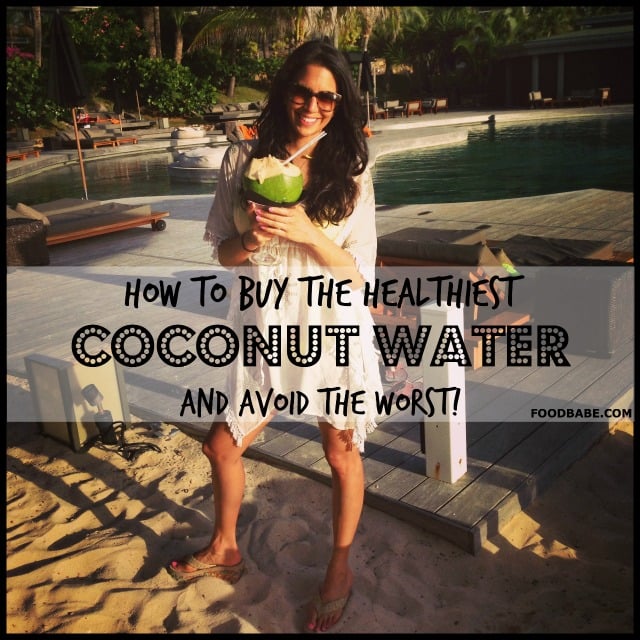
Coconut water is one of the healthiest drinks on the planet
Coconut water contains a unique combination of B vitamins, vitamin C, micronutrients, and phytohormones that are exceptionally beneficial to your health. A scientific review of coconut water, published in the journal Molecules, highlights some of the ways that coconut water replenishes your body:
- Helps to prevent heart attacks
- Lowers high blood pressure
- Can have anti-aging effects
- Fights free radicals to help prevent cancer
- Contains trans-zeatin which can be used to treat Alzheimer’s disease or dementia
That being said, I don’t want you to think it’s okay to pick up just any coconut water off of the shelf. Packaged coconut water is really flooding into the market recently. You can find it in bottles, cartons or powdered, frozen, flavored, carbonated, and sweetened. With all these choices it can be confusing and difficult to know if you are choosing the best one.
It usually costs at least $3 bucks a bottle, so it’s not exactly affordable- and if I’m going to spend my hard earned money on some, I make sure it’s worth it! Primarily, I look for coconut water that is the least processed and still has the majority of its nutrients intact. This is always going to be directly from a fresh coconut – but, of course that’s not always available. If you haven’t already heard, Pepsico and Coca-Cola have their own versions of coconut water – (O.N.E., Zico, Naked) – and you can only imagine what the corporations have done to it.
How To Ruin Coconut Water
Using a concentrate instead of fresh juice: Some coconut water companies get away with saying their drinks contain “100% Coconut Water” that’s “All Natural” even though it’s made from a reconstituted concentrate. Just like other juices in the store, they heat fresh coconut water and reduce it to a syrup. It’s cheaper for them to import this coconut water syrup, which they later add water prior to packaging. Any juice that has been heated to this extent loses a significant amount of its nutrients and its beneficial enzymes are denatured (i.e. the enzymes don’t work anymore).
Taking water from mature coconuts: This is a biggie. Young coconuts on the tree are usually green with an abundance of water in the center that is full of nutrients. Anyone that drinks coconut water straight from a coconut is drinking out of one of these young coconuts. As they begin to age, the nutrients in the water begin to seep into the meat of the coconut, and the water becomes less nutritious. It’s essentially watered-down. This also happens when young coconuts are picked and allowed to lie on the ground in the sun, for an extended period of time. While older “mature” coconuts might be used to make coconut oil, coconut milk and other coconut products, the coconut water from older coconuts is often discarded because it’s lacking nutrients and doesn’t taste the same. As the popularity in coconut water spiked recently, companies realized that they could buy up the water from mature coconuts and could get it cheaper than young coconut water. This is why it’s important to drink young coconut water and not get scammed into drinking the watered-down and less nutritious version.
Adding “natural flavors” or sweeteners: Young coconut water is refreshing and sweet, so there is absolutely no need to flavor or sweeten it – unless you are trying to hide something. Guess what happens when they use mature coconuts for their water? It tastes acidic, so they mask this taste with natural flavors or sweeten it up with sugars. I’ve heard that some companies use a centrifuge system to remove the acidic taste, but it’s a safe assumption that if you see a plain coconut water on the shelf with any natural flavors or sweeteners added it is from mature coconuts and not worth your money.
Pasteurizing it with heat: Coconut water is very delicate, naturally perishable, and should be kept cold. Have you ever stopped to wonder why most bottled and boxed coconut waters on the shelves aren’t in the refrigerated section? I recently checked out one of these bottles and noticed it didn’t expire for 2 years! This is because most coconut water at the store is heat pasteurized, which literally means that it’s been cooked to a very high temperature to kill bacteria and extend its shelf life. It has been shown that heat also destroys some of the vitamins, minerals, and phytonutrients and also denatures enzymes – stripping its benefits and much of its flavor. If coconut water is from concentrate, this would be the second time it’s heated. Obviously, your best bet is to seek out and find unpasteurized raw coconut water. This can be hard to find, but there is another way to kill bacteria while keeping the nutrients intact: HPP (high pressure processing). Without using heat, HPP is best way to preserve the goodness in coconut water, while extending its shelf life a little to make it more available commercially.
Dipping whole coconuts in formaldehyde or sodium metabisulphite: It’s been reported that some non-organic coconuts may be preserved for transport to the U.S. by dipping them in chemicals, including formaldehyde a known carcinogen. This leads to the possibility that these chemicals seep into the coconut meat and poisons the water. Some of my favorite organic cafes avoid this by getting frozen coconut water shipped directly to them.
We called up several of the most popular coconut water companies and asked where they source their coconuts (young vs. mature), if they dip them in chemicals, how they pasteurize them, and about additives and preservatives that they may use. We got a variety of responses, and it’s almost surprising to me how much some of these companies have screwed up something as basic as coconut water. I found several brands to avoid, because they are so heavily processed that the final product barely resembles natural coconut water.
Coconut waters to avoid at all costs:
Naked Juice Coconut Water – Although it’s not from concentrate, Naked told me that they use “mature” coconut water that is flash pasteurized with heat. The plain variety doesn’t have any additives, but all of the flavored ones have added natural flavors. This is also a Pepsico brand – a company that spent over $4 Million dollars to fight GMO labels – so they aren’t getting any of my business.
O.N.E. Coconut Water – This is another Pepsico brand that is flash pasteurized with heat. The flavored waters “with a Splash of Fruit Juice” contain natural flavors and “sugar” as an ingredient. As it doesn’t say “cane sugar” on the label, this could very well be from GMO sugar beets.
Pepsico told me that they couldn’t confirm whether their sugar is GMO because:
“the exact source of the sugar in our coconut water cannot be confirmed because we source our ingredients from around the world and that information is not available at this time. Please know that all of our products comply with all applicable food laws and labeling requirements. O.N.E. Coconut Water relies on the regulatory agencies charged with safeguarding our food supply when sourcing ingredients for our products”.
They are relying on the FDA’s regulations to protect us, although the FDA themselves say that the manufacturer is responsible for ensuring the safety of the ingredients used in their products, including GMOs.
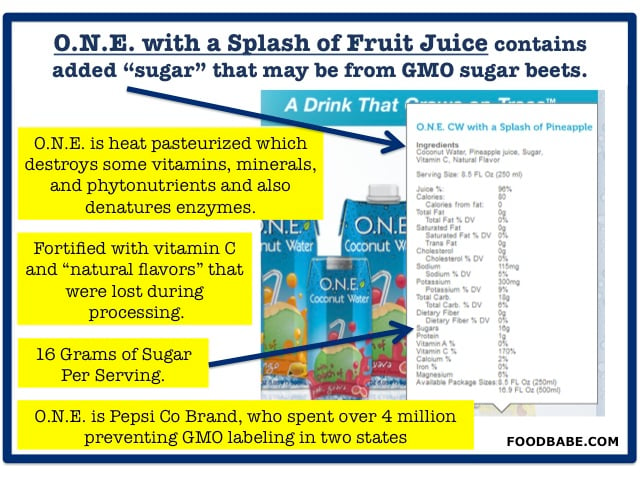
Zico – They sell two entirely different coconut waters depending on which packaging you choose. The waters in the bottles are made from concentrate and are a “blend of Asian coconuts” with natural flavors added. On the other hand, the ones in the tetra-pak cartons are not made from concentrate, have no additives, and contain only Thai coconut water that is packaged in Thailand. A bit confusing, isn’t it? While the tetra-paks (boxed) seem like a good choice, they use “Ultra High Temperature Pasteurization” to give it a long shelf life. This means it’s heated well above boiling point to 280 degrees Fahrenheit, which “kills everything” according to Scientific American, including beneficial nutrients. Plus, in case you didn’t hear the news, they were recently acquired by Coca-Cola – a big supporter of GMOs who have spent over 3.2 million to prevent GMO labeling.
CocoZona – We called and emailed them on several occasions, and they never replied to any of our questions – not even a peep! I always find it alarming when a company refuses to stand behind their product and isn’t transparent about their practices, especially since some companies have been caught lying about what’s really in the bottle. So, at this point, we know little more than what’s printed on the bottle of CocoZona, and the ingredient list reveals that it is made from concentrate. That’s enough reason to stay away from it.
Vita Coco – Don’t be fooled by all of those celebrity endorsements! Their waters are not made from concentrate, but they are all pasteurized with heat. Many of the flavored versions contain added sweeteners and the Cafe versions contain carrageenan. Even the seemingly plain 100% pure version contains added “fruit sugar.” Watch out for their coconut waters targeting kids, which are loaded with added sugar and many different natural flavors – they are not 100% coconut water! According to their website, Vita Coco Kids is also ultra high temperature pasteurized.
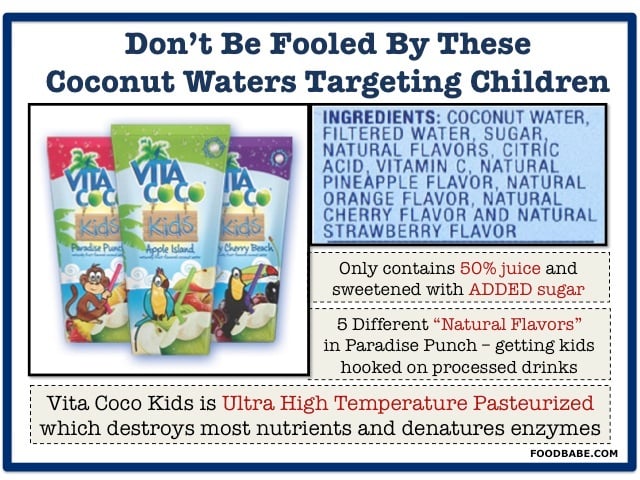
GOYA – This brand is heat pasteurized and contains added preservatives. Some versions are sweetened with sugar, which may be GMO. Because I vote with my dollars, I avoid any GOYA brand product as they spent over $56K to fight GMO labeling in California.
C2O – They told me they heat pasteurize their water up to 120 degrees celsius once the product is in the can for as long as 5 minutes. Although, they use no additives or concentrates, the length of this high heat processing puts it squarely on my avoid list.
Purity Organic – It’s made from concentrate and flash pasteurized with heat, so some of the goodness has been destroyed. It’s organic I know, but not all organic products use the best practices!
Coco Libre (Organic) – It’s made from concentrate, flash pasteurized with heat and has added “natural flavors.”
How do other popular coconut waters stack up?
Munkijo (organic) – This water isn’t from concentrate, contains no additives or added sugars and their young coconuts are sustainably grown and harvested. But I’m sorry to report they also use ultra high heat pasteurization to process their waters, so it’s far from the best on the market.
Coco Hydro by Big Tree Farms (organic) – I really like Big Tree Farms’ mission geared towards sustainability. Their unique version of coconut water is powdered and comes in packets that travel easily. So, there is no pasteurization involved, you just add water to reconstitute it. However, the process they use to evaporate the water uses heat, so it is not considered raw and some of the nutrients may be destroyed in the process.
Taste Nirvana (organic) – No concentrates or additives in this brand, and their young coconuts are sustainably grown, harvested and organic (though not labeled as such). I really like how it’s packaged in glass bottles. They are the only company that told me they use a “steam sterilization” process which is a combination of steam and pressure.
Amy & Brian (organic) – Other than the fact that they flash pasteurize the water, all other aspects are good – no additives, no added sugars, no concentrates. They also told me that their young coconuts are not treated with any chemicals or pesticides. I have to admit though, I’m not a fan of the cans they are in, even if they are BPA-free.
Harvest Bay (some varieties are certified organic) – They flash pasteurize their water for about 2 seconds at 120 degrees, and it’s not from concentrate. Some of their waters are now organic, and they are all non-GMO project verified. Although they add no sugars or additives to their plain version, most flavored varieties contain added sugar or natural flavors, so I’d avoid those.
Whole Foods 365 – They confirmed they don’t use a concentrate, however they heat pasteurize their water which comes “from around the world depending on availability”. Their water is also packaged in cans, which I don’t like!
Trader Joe’s – Their water is not from concentrate, but it is pasteurized. I have yet to hear back from them in regards to how they pasteurize their water (whether they use flash or ultra processing). They fortify their water with added vitamin C, which is a red flag that it has been heavily processed.
My top picks for packaged coconut water:
***This chart contains examples of the coconut waters we researched, however, there are many more available on the market or may be available in your neck of the woods. Please use this post as a guide to find the best coconut water in your area.***
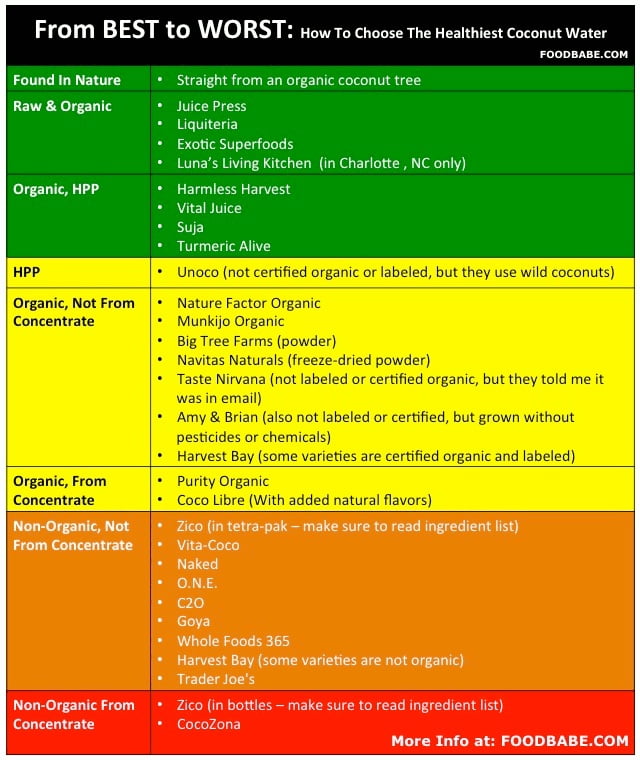
While the best coconut water is straight from a young coconut picked from a tree, these packaged waters below are as close to the real thing as you can get. They don’t use any heat processing or concentrates, so they aren’t cooking your coconut water. Some of them use HPP to kill bacteria, and a couple of these brands serve it up completely raw and unpasteurized.
Harmless Harvest (organic) – I’ve written about this brand before, and it’s no secret that they are my favorite. I had the pleasure of meeting with the founders of Harmless Harvest and I’m blown away with how open and honest they are about everything. They’ve become a success not because of marketing, but because of their good practices. In fact, they hardly spend any money on marketing at all (and bloggers are not compensated either). They source their young coconuts from small organic agroforestry farms that pay a fair wage to their workers. The coconuts are then frozen and shipped to the U.S. for packaging, after which they use HPP processing to kill bacteria and extend the shelf life to 60 days. Because it’s so minimally processed, some of the waters turn pink when the naturally occurring antioxidants or phenols are exposed to light – and you won’t find this in pasteurized coconut water. You can find this at Whole Foods and most natural food stores in the refrigerator section.
Juice Press (organic) – This water is totally raw. It’s not pasteurized or processed with HPP. Their coconuts are shipped frozen to the store and then they ship it fresh to you with a 3 or 4 day shelf life.
Exotic Superfoods (organic) – Another fave, this water is 100% organic and raw. It is not processed with any heat or HPP – but it’s kept frozen to preserve freshness.
Liquitera (organic) – This bottled raw coconut water is also organic, without any pasteurization. It’s only available at their stores in New York.
Vital Juice (organic) – It’s never heated or frozen, and it’s preserved with HPP, 100% organic and non-GMO project verified. It is currently only available at stores in Washington and Oregon with plans of expansion, and you can also order it online on Amazon.
Unoco (wild coconut) – Made from wild coconuts (not from a plantation) and processed with HPP without any additives. It’s only available in California right now.
Suja (organic) – Suja makes a coconut water blend, Tropicaloe, which is made from freeze-dried coconut water mixed with pineapple, apple, aloe, lime, mint and spinach juices, all preserved with HPP. This juice is exclusively sold at Whole Foods stores.
Keep in mind that while I think coconut water is amazing, I don’t drink it every day, I use it as a treat or on days I am very active and sweat hard!
If you know someone who loves coconut water or needs a great substitute for soda, Gatorade, Powerade or other unhealthy drinks – please share this post!
We must educate as many people as possible about their choices to change the marketplace. When we change the marketplace and start spending our money on the best and safest brands, we change the world!
Xo,
Vani




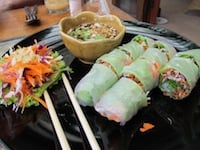
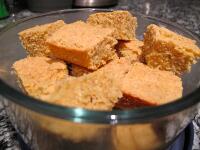


Thank you for the research on these particular products! I literally bought Vita Coco Kids a few weeks ago for our daughter a few weeks ago–now I know what to watch out for!
Hi There;
Do you have any info on the Sun Tropics brand? Purchased in Canada at Costco. This water is in a tetra pack, claims to be pure /not from concentrate with no added sugar?
This is what the website says
http://www.suntropics.net/new-product-detail.php?id=79
• 100% Juice
• Not from Concentrate
• All Natural; No Preservatives
• No Sweetener Added
I guess you need to find out whether their juice comes from baby green coconuts, or adult ones, otherwise sounds good and can buy on Amazon. So it says.
Ravi:
This brand says to coconut to packaging in 12 hours, right from the coconut and they claim they are young coconuts, but expensive.
SunTropics Coconut Juice on Amazon
Rising Sun Thai Coconut Water with PULP (With Pulp)
http://www.amazon.com/dp/B00DOFD06E?psc=1
I did not get the correct name and link above, and its like $27.00 for a 12 pack. 🙂
Rising Sun Thai Coconut Water with PULP (With Pulp)
http://www.amazon.com/dp/B00DOFD06E?psc=1
I loved coconut water & feel really fortunate to be able to walk 10 mins from my apartment to a street cart that sells fresh green coconut daily @ USA 1 per unit. I stay in one of the Asean country where coconut is available year round.
Vani – thank you & keep up the wonderful work.
Thank you, Does freezing kill the enzymes? I usually get brain & Amy brand, I think the canned tastes better than the tetra pak’s– they have a plastic taste to me.
How is blue money brand in a can.
Thank you for these latest news on coconut water…amazing differences and for all other articles and info you share with all of us
I have a can of Amy & Brian’s from awhile ago– with no expiration date. Any idea if it goes bad?
Dan –
I think Gary Null would highly disagree with you. I hear him talking about coconut water and electrolytes sometimes. I would guess that he’s more knowledgable than those nutritionists you referenced. He’s also a serious runner and talks about how he always uses coconut water for the electrolytes.
Thank you again Vani for another great investigation. I had been looking at all the coconut waters trying to figure out which one to get, this article really helped me know which ones to avoid.
Thanks for this information. Unfortunately if I’m on the run and need something more than water to restore my body’s electrolytes, VitaCoco is usually the only option at a quick convenience store stop. It’s still a much better choice than Gatorade!
FULL DISCLOSURE: THE TRUTH ABOUT “PINK” COCONUT WATER
Have you seen pink coconut waters that claim to be healthier? Ever wonder what is really going on at the cellular level that results in the pink color? Several major brands say in their marketing material that “pinking” is a sign of “more antioxidants”, but notice how there is never any scientific reason given for this and their mineral level is actually LOWER than other brands that are not pink. Something just doesn’t add up…
So, I decided to look closely at the HPP technique (High Pressure Processing) to see what was happening at the cellular level. What I found was both enlightening and also a bit shocking, especially given the marketing behind pink coconut water and endorsement by major retailers.
First, I must say that I LOVE HPP for locally sourced beverages when I cannot make them at home with a blender or juicer or eat the actual fruit, which is always the best way to go in order to get the wonderful fiber and to lower the Glycemic Index. Locally sourced is important, as HPP requires refrigeration and plastic containers that are ultimately very harmful to our environment; over 50% are never recycled. There’s a Texas-sized island of plastic sludge floating in the Pacific Ocean and I’d like to minimize my contribution.
Now the truth…
“Pinking” is NOT due to more antioxidants or other nutrients being present: it is due to early onset oxidation and degradation at the microscopic level of cellular walls that are permanently denatured when pressurized above roughly 300 megapascals (145 psi per megapscal, MPa) for more than about 3 to 4 minutes. Different cell structures can withstand varying pressures for varying times, but this is fairly consistent with juices from fruits and vegetables. Coconut water is pressurized at nearly 600 MPa, equal to over 80,000 psi! That not only kills potential bacteria, which is good, but also is plenty of pressure to denature enzymes, proteins and other organic cells.
Here are a few quotes from a non-biased scientific study of HPP that takes a close look at the benefits and challenges to this processing technique. The title of the study is Opportunities and Challenges in High Pressure Processing of Foods and can be found online in its entirety…
At high pressures, microbial death is considered to be due to permeabilization of cell membrane. For instance, it was observed that in the case of Saccha- romyces cerevasia, at pressures of about 400 MPa, the structure and cytoplasmic organelles were grossly deformed and large quantities of intracellular material leaked out, while at 500 MPa, the nucleus could no longer be recognized, and a loss of intracellular material was almost complete (Farr, 1990).
The application of high hydrostatic pressure affects cell wall structure, leaving the cell more permeable, which leads to significant changes in the tissue architecture (Farr, 1990; Dornenburg and Knorr, 1994, Rastogi, Subramanian, and Raghavarao, 1994; Rastogi and Niranjan, 1998; Rastogi, Raghavarao, and Niranjan, 2005)
The distribution of pressure–temperature–time profiles within a product can result in differential enzyme/microbial inactivation levels, as well as nutritional/sensorial quality degradation (Denys, Van Loey, and Hendrickx, 2000b)
Now, pink coconut water is not necessarily any worse than normally colored coconut water. The minerals are not affected much by pressure or heat, and minerals are what provide the most functional benefit of coconut water in addition to the hydration. But, truth in marketing and advertising is important and should not have to be a luxury for consumers.
I like to understand what happens to the food I consume, so I hope this was helpful.
Seeking Truth,
John Ross
Thank you John… Your info. is very good. I think Coconut Water is so overpriced so it can’t be on my list… but for people who can afford it, it’s good to know that you’re getting the best for your money. Leave it to the Big M’s to adulterate one of the purest forms of Natural Nutrients the Creator made for our benefit.
Great info.!!!
Thanks for John for such valuable information- it was indeed very helpful. I actually shared a post on pink coconut water (which was a gift) and believed all of the marketing hype.
I still love fresh coconut water from the coconut itself, and will continue to do so.
Hi Astrid- With so many false claims out there, it’s understandable (although frustrating) that people would think our pink bottles are marketing hype.
As a company without a marketing budget, we sincerely love our pink bottles.
People thought we were crazy for selling bottles with varying hues, and even crazier that they could turn pink after customers purchased! We were told to use additives and heat our product, simply for aesthetics–so all the bottles would look the same. Instead, we left it. We added nothing. We took away nothing. The pink bottles taste the same to us as the clear bottles, and in our extensive testing, we have found the color to be the only real difference. We would love to talk to you more about it if you would like to email us at [email protected].
We agree with your mentality of Seeking Truth – that’s why we started Harmless Harvest in the first place.
There are many factors that go into the natural pink color variation, even more than you mentioned here. We see this hue in bottles even before the high pressure processing and, although we could hide the color with ascorbic acid and other additives, because it is natural and just as delicious as the other bottles, we decided not to.
The results of HPP vary incredibly depending on the time, temperature, and amount of pressure used, as well as the product undergoing the process. This process is also not a magic wand, and our coconut water requires many steps to maintain quality along the way.
We are always interested in learning and improving. Do you have links for the papers you cited? We would be happy to discuss it further if you would like to email us at [email protected]
@Jenna from Harmless Harvests,
Thanks for clarifying the facts about your product. It can be daunting to weed out the only-make-money promising companies vs good-honest ones. After reading about your product, and what you company is all about– I feel your product deserves a second change. I left the post on pink water by the way!
I am open to some more information and digging deeper. I still remember the flavor of that water… it was great to be quite honest.
Keep up the good work, we are all about companies like yours who try hard and; really care!
Astrid
Good list, Vani! I was expected HARMLESS HARVEST on top because they use PRESSURE to kill the bacteria (instead of heat pasteurization) which keeps all of the enzymes, electrolytes and nutrition intact.
Another new company I came across that uses the same pressure treatment is INVO, also from Thailand. Currently, I only see these at Whole Foods.
Please also look into ZOLA. I talked to them and they do use some heat pasteurization, but not as much as some others. The taste for all 3 of these brands is really good. Keep up the great work!
Nope, that is not true, sorry to say. Pressurization kills the enzymes as much as heat, possibly more depending on how much pressure is used and for how long (see study cited above).
Not your fault for believing that, as there is unfortunately a lot of smoke and mirrors out there. HPP is a nice process, but not the silver bullet it’s marketed as. Believe me, I wish it was.
Thank you Bruce!
High Pressure Processing can have varying effects depending on the product, amount of pressure and time, and temperature during the process, we have based our information on extensive testing of our coconut water with our specific handling.
Have you tried CocoLife Trucoco. Suzanne Somers promoted this on her show (a limited Four week program sponsored by Life Extension Foundation). It is bottled in glass and plastic and judging by the mixed reviews on Amazon, the glass bottled tastes better. Whole Foods also sells it although I have only seen it in a limited supply. On another subject, have you heard anything on the latest sweetener Sin-Free Sugar? It is a “naturally based” sugar. The ingredients are listed on their website sinfreesugar.com.
Thank you again for another great post. Wow, there is so much to know! But we are learning from you and making changes. Keep up the great work.
Geege
My wife and I just moved back to US after working in India for 4 years. I had a coconut water on the street everyday as well as a mangoe every day when in season. I have no desire to try either in US….I would just be punishing myself 🙁 Dave
Dave that was punishing all of us to hear about those delicious and healthy treats being so readily available in India, but not in the US. Lol! 😉
Imagine how we feel? 🙁
What About Nirvana Coconut Water?
It tastes like a real coconut.
Thx for the info..
Just wanted to understand what you mean by organic tree?
How can I print a copy of your article re coconut water? It was very informative. I don’t want to subscribe because I am getting so much email. Thanks. Dukh Niwaran
Great info! So far, the only coconut water I have tried and loved is Zola. I don’t see that brand mentioned in your review. Any thought?
Hi Vani,
Thank you so much for a very thorough breakdown. I was wondering if an update could be done to the list to include Nudie and Cocobella both purchased here in Australia?
Thank you
Awesome List !! Thank for sharing!!!-
thanks Vani, Very helpful information! One aspect I hope you consider in the future is gamma irradiation of young green coconuts to bring them to market and preserve them indefinitely. Which brands use this practice and how can we avoid it?
Dear Vani, do you have a recommendation for a powdered drink mix ( like gatorade) that can be added to water for our long hikes. we want to stay hydrated and refueled. we do drink lots of filtered water from nearby water sources but sometimes need a flavor esp. at high altitudes climbing when you should drink but don’t feel thirsty. help… we love your and treasure your thorough research. our whole family has benefited from not processed food and watching labels on tricky organic products. Thank you, Jen
What about Rising Sun Thai coconut water? It is sold a lot in Charleston, SC.
YOU ARE AWESOME! Thank you for you!! <3
I just sampled a pink coconut water at sprouts this afternoon and it tasted like fingernail polish remover. the marketing consultant had stepped away from the table and I thought (for a second) that I had drunk something that wasn’t meant for consumption. I was thinking, “was that some sort of soap or cleanser?” but no, it was coconut water. I have written to zico a few years ago because I noticed how different the bottled version was from the tetrapak version. they sent me coupons to buy more! the bottled version tastes synthetic, and I told them as much..
Hi, do you have an opinion on the Inner Eco brand which I see quite a bit in Whole Foods and other organic markets? Thanks a lot for all the good info.
King Island coconut water says on its label that it uses young green coconuts and not from concentrate. And it tastes good.
Very nice educational article. I bought a green coconut for the first time to drink from it, I have a question about those, how long are they good for?? It tasted just fine so mine was good but wondering how long those stay good for, of course right off the tree is best 😀 Thanks.
Great info! Thank you for all your amazing work!
Ugh so all the orange and red ones were my options at sprouts last night! Even the health food store can’t give us what we need. So infuriating!
Do you have any info on the Sprouts brand? That’s what I ended up buying. I know you have trader joes and whole foods….are they probably pretty similar?
Thank you SO much! I am a big coconut water drinker. I actually have it every morning and sometimes the afternoon. I have been drinking Zico (did not know Coco Cola just bought them) and I am bummed to read this. I will be making a trip to whole foods tomorrow for a better product! Thabk you thank you!
INVO is another brand that is manufactured the same way as Harmless Harvest. You can find it at Whole Foods in the refrigerated section. I also noticed that Trader Joe’s in California is carrying HPP refrigerated water. I think it is one of the two companies above branded under TJ’s.
Hi Jessica – Our organic coconut water is not currently available at Trader Joe’s and is not privately labeled.
Check for locations here: http://harmlessharvest.com/find-us
Hi Vani !
In New Delhi, India, we get fresh coconut sourced from the Southern coastal states. How do you think they are transported to Delhi. In trains of course, but is it done in a safe way or here too they dip it in formaldehyde. Pl give your opinion.
I am at sea about this whole thing until i went through your wonderful article.
Your coconut water article was extremely timely for me since I’ve only recently started using it in cooking. The brand I picked by luck was “100% raw” in a plastic bottle at Kroger labeled “extremely perishable” with ingredients: coconut water. You might want to consider it for your list since it is in wide distribution.
Taste Nirvana is my favorite! 🙂
I’ve just switched from Powerade (because of what I read on your site) to the readily available coconut waters at the market….now I’ve learned the truth about those and need to switch to some other brands! I tried one called Cocozia when I visited family in FL. It tasted great and seemed to be better for you, but now I’m not sure. I would love to know if this brand would make your list! Please help!!!
Thank you! I’ll be switching to Amy & Brian’s and will look for the better ones too.
What about Edward and Sons – Nature Factor organic coconut water? I think it’s stored at room temperature 🙁
Hi Carla – Nature Factor is listed in the chart above, in the yellow section. It’s organic, not from concentrate and made from young coconuts from Thailand. It is heat pasteurized (but not flash pasteurized).
I used to live in Bali Indonesia. A coconut a day keeps the Dr. away. I’d like to know what they can do with the coconut husks. There must be some way to recycle them into something useful!
Hi Lacey,
I’m from the Philippines and grew up surrounded with coconut tree plantation. The people in the province use the husk (from mature coconut) for polishing the bamboo flooring or wood floors. First we apply the floorings with floor wax and use our legs back & forth to polish the floor with the coconut husk polisher. It gives you a good cardio workout. Almost 100% of the coconut tree is usable. Including the roots (which gives it a natural fertilizer for the soil). The leaves maybe made into a roof of a Nipa hut. Sticks that came from the leaves maybe used a brooms. The shells maybe used as ladle. The retired coconut tree maybe used a firewood.
Coconut water is delicious, brings me fond memories, and I’m glad that all this info is coming out now about exactly how great it is, but…..
Honestly, I AVOID drinking all coconut water products. I honestly get ENRAGED when I see these products mainly because THEY TASTE NOTHING LIKE REAL COCONUT WATER and they cost an arm and a leg!!! Not to sound haughty or anything, but I’m from Jamaica and grew up drinking coconut water. My family lives in South Florida and we even have coconut trees in our yard (like a lot of people in this part of the country) and this is the only time I’ll drink coconut water in the States. I wait until the tree decides to give it to me. Tasting these coconut waters have even lead me to reevaluate my consumption of any and all exotic juices, fruits and other foodstuffs, I think to myself “OMG what does the fruit actually taste like then???”
I agree with one of the comments above. Invo is a great alternative to Harmless Harvest and very similar in taste. Unfortunately it is only currently available in select Whole Foods locations.
Another great product (imo, better tasting and much cheaper than HH) is Copra.
What do you suggest for those who must have pasteurized products for medical reasons?
We’ve been buying Zico, but will switch to Harmless Harvest. I just wrote Zico a letter on their website, stating that I won’t buy their product any more, and they need listen to the FoodBabeArmy!
Hi
What about Go Coco?
http://www.amazon.co.uk/NEW-Coco-Coconut-Water-Litre/dp/B00CJA1RY2/ref=aag_m_pw_dp?ie=UTF8&m=A21805NH6YOSXD
Thanks
Hi, Food Babe!
What do you think about thirsty buddha coconut water? I drink this so much and would love to know if it is food babe worthy? thanks!
http://drinkthirstybuddha.com/#_
Vani,
Excellent job as always! I remember watching a documentary on how the owners of VitaCoco started and it all sounded so perfect. Funny that my husband purchased the flavored coconut-water for our son and was so delighted to show me the little treasure he had found. He knew I’d be pleased, but when I read the ingredients I was less than thrilled. We drink fresh coconut water occasionally, but after this report we will definitely skip the bad brands, and the real deal or stick with the better brands.
Thanks so much for all you do! We are very grateful and appreciate your hard work for being in the front lines. Your name always comes up in topics of conversation regarding major food changes 🙂 You are making history in the future of our food, thanks for being brave–deserves recognition.
Keep up the great work, we are all in this together
XOXO
Astrid
What about Maui & Sons? How do you think it measures up? I like it, the ingredient list will need to be read again now that I read this article.
Thank you for providing more info.
We are lucky that our closest wholefoods sells fresh coconut water. It’s shelf life is about a day, but there is no in taste comparison to products with a longer shelf life. The worst brand I tried was Blue Monkey, it taste like a few spoons of sugar dissolved in water – not a hint of coconut taste. Other brands have been better but if I cant get fresh water I am not going to bother.
Thank you for all of the amazing info. you provide …